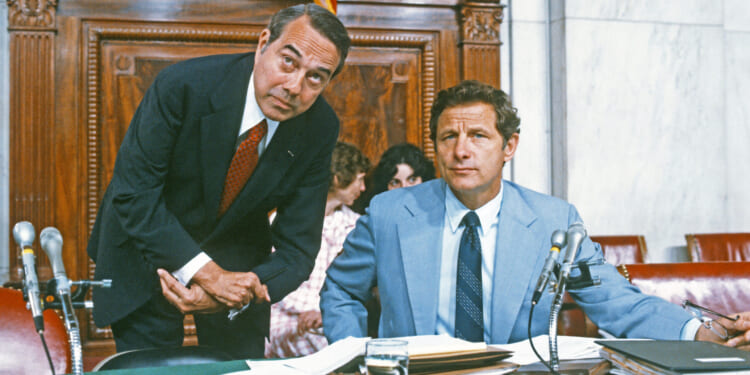If it ain’t broke, break it.
That’s Joe Biden’s guiding principle. He took President Donald Trump’s much-tighter southern border and ripped it as wide open as a gutted trout’s belly.
Biden turned Trump’s energy independence into begging Iran and Venezuela to pump more oil. And Biden devolved Trump’s peace in the Middle East into a five-front Arab war on Israel, even as the ayatollahs’ Houthi pals ignited the Red Sea with anti-ship missiles and anti-American drones.
And for his next trick, Biden wants to impersonate a Latin autocrat.
On Dec. 7, a date that shall live in infamy, Biden’s Commerce Department proposed a mechanism to invoke the so-called “march-in” clause of the 1980s-era bipartisan Bayh-Dole Act. This would empower Uncle Sam to capture and control patents that fully or partially were funded with federal research grants if Washington bureaucrats disliked the market prices or rollout speeds of their ensuing technologies.
“March-in” authority. What a perfect image: Jackbooted thugs stomping on private property and seizing it for Big Government.
As usual, Biden hopes to capsize the efficient, productive status quo. Since then-Sens. Birch Bayh, D-Ind., and Bob Dole, R-Kan., secured this legislation, universities and other institutions have owned the patents that emerged from federally funded research. Many then license those patents to companies and entrepreneurs who nurture them into goods and services. (Officially, the law is the University and Small Business Patent Procedures Act of 1980.)
“Since its passage more than 40 years ago, the Act has spurred nearly 300 new drugs and discoveries that have driven the innovation economy—contributing $1.7 trillion to the U.S. gross industrial output and adding more than 5.9 million jobs,” according to Laura Savatski, former chair of AUTM, an intellectual-property licensing group.
Before Bayh-Dole, under 5% of federally supported patents were licensed. By 2022, AUTM data show, 9,884 licenses and options arose among that year’s 16,857 U.S. patent applications. By that measure, 58.6% of patents typically are licensed each year, nearly 12 times the pre-Bayh-Dole pace.
The resulting embarrassment of riches has improved lives from Kansas to Kazakhstan:
- Google’s pioneering search algorithm
- Zerit anti-AIDS treatments
Now, imagine life with few new amusements, business tools, or medical cures. The ever-meddlesome Biden now wants new powers to reassign or simply nationalize patent licenses if his pests decide that these items are not marketed quickly or cheaply enough.
“Bayh-Dole did not intend that government set prices on resulting products,” its authors explained in The Washington Post. “The law makes no reference to a reasonable price that should be dictated by the government. This omission was intentional.”
Such Big Government caprice would karate-chop private investment. Why would venture capitalists license new patents if federal busybodies could march in, expropriate and award them to politically connected competitors?
Even worse, anti-capitalist bureaucrats could snatch licenses and sit on them while chanting “Equity!”, “Social justice!”, or “Climate!”
As it happens, no administration—Democrat or Republican—has marched in on a patent since Bayh-Dole blossomed. While screaming “Democracy!” Biden lusts for a nightstick to bash to bits this 44-year-old precedent.
Biden & Co. argue that when the state goes marching in, cheaper medicines will flow like the mighty Mississippi. This will prove to be yet another Marxist mirage, as drug companies avoid licensing patents for fear of being fleeced by the “Everything for All” crowd.
Taxpayers also will suffer if these patents cannot be harnessed. They never will taste the fruits of scientific developments that stay theoretical. They also will not collect the corporate taxes that commercialization now yields. In that sense, taxpayers’ return on federal research investment would dwindle, potentially to zero.
While America faces a $34 trillion national debt, and $875.5 billion in annual debt service, the marginal corporate taxes from these new products represent federal revenues generated by economic growth, rather than higher tax rates. Even the late, great Milton Friedman would bless such tax receipts. Assuming today’s 21% corporate tax, Bayh-Dole’s $1.7 trillion in blessings already would have rendered unto Ceasar up to $357 billion.
Bayh-Dole was “possibly the most inspired piece of legislation to be enacted in America over the past half-century,” The Economist swooned in 2002. It “unlocked all the inventions and discoveries that had been made in laboratories throughout the United States with the help of taxpayers’ money. More than anything, this single policy measure helped to reverse America’s precipitous slide into industrial irrelevance.”
But 22 years later, Biden is not amused. As he bans gas stoves and incandescent bulbs, mandates electric vehicles, censors his critics, and labors to imprison the leader of the opposition, he increasingly resembles the late, but not-so-great Latin dictator Hugo Chavez.
Giving Biden and his comrades the power to smash patents and grab them for “better uses” would imperil property rights and endanger innovation. It could cripple the conveyor belt that speeds modern marvels from university labs to Best Buys, Walgreens, and Whole Foods across America.
Biden should peel his sticky fingers off Bayh-Dole.
The Daily Signal publishes a variety of perspectives. Nothing written here is to be construed as representing the views of The Heritage Foundation.
Have an opinion about this article? To sound off, please email letters@DailySignal.com, and we’ll consider publishing your edited remarks in our regular “We Hear You” feature. Remember to include the URL or headline of the article plus your name and town and/or state.












